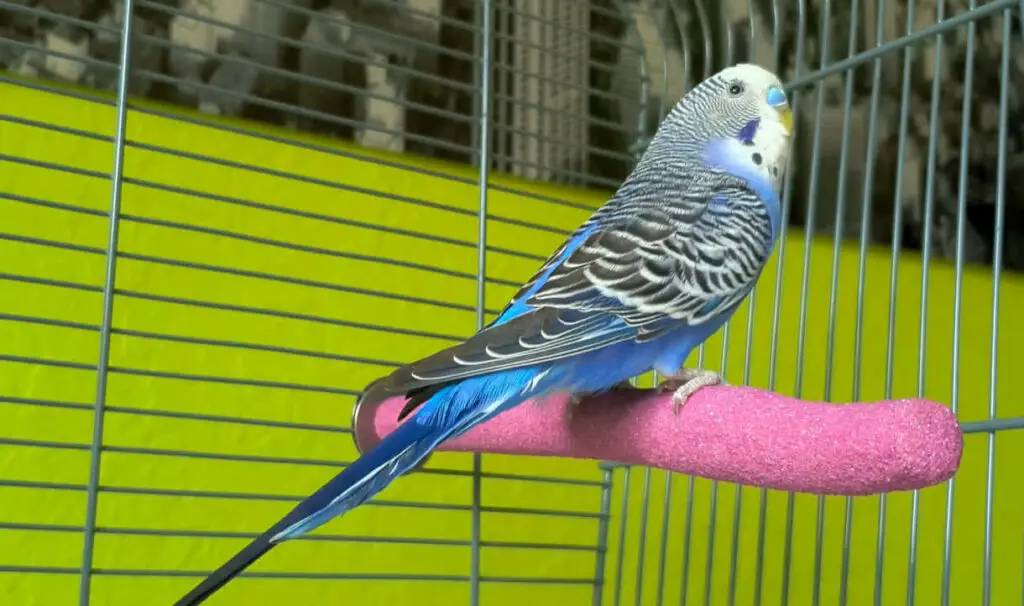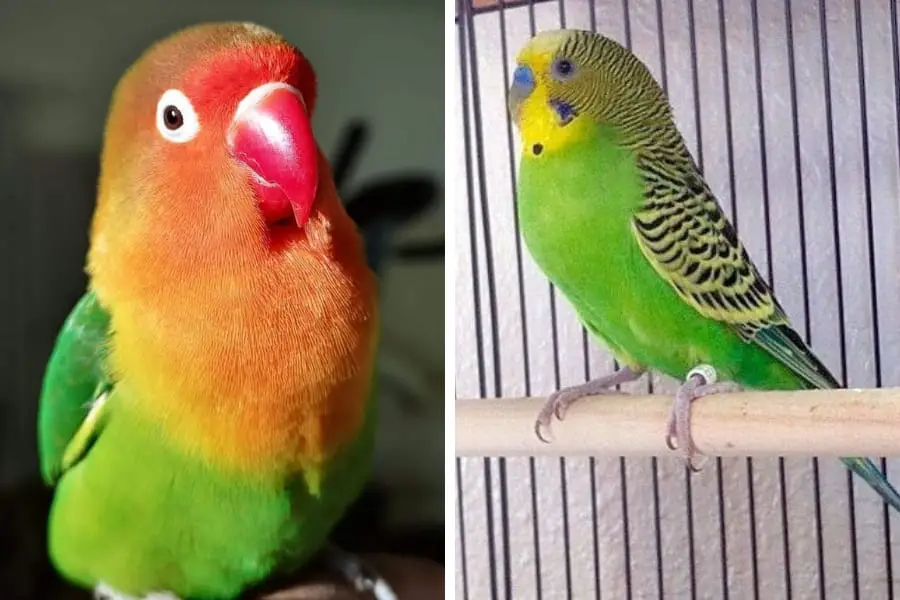As a parakeet proprietor, you’ve got doubtless encountered a wide selection of quirky and endearing behaviors exhibited by your feathered buddy. From their charming chirps to their playful antics, parakeets carry pleasure to our lives in numerous methods. Nonetheless, one conduct that may depart pet homeowners each puzzled and anxious is when “my parakeet laid an egg on the cage ground.” When you’ve discovered your self on this scenario, you are not alone. This complete information is to make clear the explanations behind this prevalence and offer you the information it is advisable to reply appropriately.

Contents
Why Do Parakeets Lay Eggs on the Cage Flooring?
Listed here are three most important causes which clarify for you why my parakeet lays an egg on the cage ground.
Pure Nesting Instincts
Parakeets are cavity-nesting birds by nature. Within the wild, they search out tree hollows or different sheltered spots to put their eggs, offering a secure and safe setting for his or her offspring. When saved in captivity, these instincts do not vanish; as a substitute, they adapt to the setting offered, which is usually a cage.
- Looking for a Protected Nesting Spot: Parakeets will instinctively seek for a safe nesting spot inside their cage. Typically, they select a comfy nook or a excessive perch.
- Why the Cage Flooring?: Generally, a parakeet might lay an egg on the cage ground as a result of a perceived lack of higher choices. This may occur if the cage would not present appropriate nesting alternatives, or if the fowl feels insecure in its chosen location.
Well being Points
Pure instincts play a big position in a parakeet’s egg-laying conduct. However well being points can even contribute to the phenomenon of laying eggs on the cage ground.
- Abnormalities in Reproductive Organs: Sure well being circumstances can result in abnormalities in a parakeet’s reproductive organs, making it tough for them to put eggs correctly. When this occurs, they could lay eggs in surprising locations, together with the cage ground.
- Egg-Binding: Egg-binding is a situation the place a parakeet is unable to go an egg. This may be life-threatening and sometimes necessitates speedy veterinary consideration. In some circumstances, egg-bound parakeets might lay eggs on the cage ground.
Environmental Elements
The setting inside your parakeet’s cage can considerably affect their egg-laying conduct.
- Cage Setup: The best way you arrange your parakeet’s cage can affect the place they select to put their eggs. Lack of nesting packing containers or acceptable nesting supplies can lead to eggs being laid elsewhere.
- Stress and Disturbances: Parakeets are delicate birds, and any stress or disturbances of their setting can have an effect on their egg-laying patterns. In the event that they really feel threatened or unsettled, they could lay eggs on the cage ground as a substitute of their most well-liked nesting spot.
Indicators of a Wholesome Egg-Laying Course of
Understanding what constitutes a wholesome egg-laying course of in parakeets is important for figuring out irregular conduct. A typical egg-laying course of consists of the next levels:
- Nesting: The parakeet seeks out an acceptable nesting location inside the cage.
- Egg-Laying: As soon as the nesting spot is chosen, the parakeet will lay an egg. This course of is often calm and never accompanied by indicators of misery.
- Incubation: After laying an egg, the parakeet will incubate it by sitting on it to maintain it heat.
- Hatching: If the egg is fertile and circumstances are appropriate, it is going to hatch right into a child parakeet.
Whereas these levels are regular, it is essential to watch your parakeet for any indicators of misery, discomfort, or deviation from this typical course of.

Easy methods to Handle Irregular Egg-Laying Conduct
In case your parakeet continually lays eggs on the cage ground or shows indicators of misery through the egg-laying course of, it is important to take motion promptly.
- Seek the advice of a Veterinarian: When you suspect any well being points, resembling egg-binding or reproductive issues, seek the advice of a veterinarian with expertise in avian drugs instantly. Early analysis and remedy are essential.
- Create a Appropriate Nesting Setting: Improve your parakeet’s cage with nesting packing containers, smooth nesting supplies like shredded paper or straw, and dimmed lighting to create an excellent nesting setting.
- Reduce Stressors: Determine and scale back potential stressors in your parakeet’s setting. This will embrace loud noises, frequent disturbances, or the presence of different pets.
- Monitor Eating regimen: Guarantee your parakeet is receiving a balanced food plan wealthy in calcium. Calcium deficiencies can result in reproductive points. Seek the advice of your vet for dietary suggestions.
- Present Privateness: Supply your parakeet privateness through the nesting and egg-laying course of. Think about overlaying the cage partially to scale back exterior stimuli.
Stopping Undesirable Egg-Laying Conduct
Stopping undesirable egg-laying conduct is vital to your parakeet’s well-being and guaranteeing their reproductive well being shouldn’t be compromised.
- Identical-Intercourse Pairing: When you have a number of parakeets, think about maintaining them in same-sex pairs to keep away from breeding conduct altogether.
- Take away Eggs Promptly: In case your parakeet does lay eggs, and also you’re sure they’re infertile, take away them promptly. Leaving eggs within the cage can encourage continued laying.
- Common Well being Verify-ups: Schedule common check-ups with an avian veterinarian to watch your parakeet’s reproductive well being and catch any points early.
- Modify Lighting: Guarantee your parakeet will get a constant quantity of daylight and darkness to imitate pure gentle cycles. This might help regulate their reproductive hormones.
- Educate Your self: Regularly educate your self about parakeet care and conduct to offer the very best setting on your feathered buddy.
Steadily Requested Questions
1. My parakeet laid an egg on the cage ground, and it appeared unhealthy. What ought to I do?
If the egg seems irregular or your parakeet reveals indicators of misery, seek the advice of a veterinarian instantly.
2. Can I take away the eggs my parakeet laid on the cage ground?
Sure, if you happen to’re sure the eggs are infertile, it is secure to take away them. Make sure the parakeet has no entry to the eliminated eggs.
3. How can I inform if my parakeet is confused through the egg-laying course of?
Indicators of stress might embrace extreme vocalization, restlessness, feather plucking, or aggression. Handle stressors within the setting to alleviate their discomfort.
Conclusion
Understanding why your parakeet laid an egg on the cage ground is significant for his or her well-being. Whether or not it is as a result of pure nesting instincts, well being points, or environmental components, taking proactive steps to handle this conduct is important. By consulting with a veterinarian, creating an acceptable nesting setting, and minimizing stressors, you’ll be able to be sure that your parakeet stays completely happy, wholesome, and free from pointless reproductive challenges.
Bear in mind, accountable parakeet possession entails steady studying and a dedication to offering the very best care on your feathered companion. By doing so, you’ll be able to benefit from the companionship of your parakeet for a few years to return.







